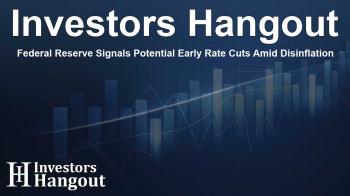Federal Reserve Signals Potential Early Rate Cuts Amid Disinflation

Federal Reserve Insights on Rate Cuts
Recent statements from Federal Reserve Governor Chris Waller have stirred conversations in the financial world about the potential for earlier-than-expected interest rate cuts. As inflation trends downwards, there's a possibility that the Federal Reserve may adjust its monetary policy sooner rather than later. Waller emphasized that current inflation numbers are inching closer to the bank's target, making cuts a feasible option.
Understanding Disinflation and Its Impact
Disinflation refers to a slowdown in the rate of inflation — what this means is prices are rising at a slower pace. Waller expressed optimism that this trend would persist, which could allow the Federal Reserve to reconsider its approach to interest rates. Specifically, he stated that if inflation continues on its downward trajectory, the market might anticipate rate cuts as early as the first half of the upcoming year.
What Waller Stated on CNBC
During a recent interview with CNBC, Waller shared, "Inflation is getting close to what our 2% inflation target would be. If we continue getting numbers like this, it is reasonable to think rate cuts could happen in the first half of the year." His comments suggest a confidence in the effectiveness of the Fed's measures to contain rising prices.
The Federal Reserve's Inflation Target
The Federal Reserve has long maintained an inflation target of around 2%. This benchmark is crucial for ensuring economic stability and fostering conditions that support job growth and wage increases. If inflation continues to align nearer to this target, the Federal Reserve may consider adjusting its rate strategies to support continued economic growth.
Market Reactions to Potential Rate Cuts
Financial markets often respond rapidly to statements from Fed officials. Waller's comments appeared to counter recent market sentiments that expected a less aggressive approach to rate hikes. Traders closely monitor such insights as they help in forecasting the future of monetary policy, influencing investment strategies across various sectors.
The Bigger Picture of U.S. Monetary Policy
The discussions surrounding rate cuts are part of the broader context of U.S. monetary policy, which aims to balance inflation control with economic growth. As the economic landscape changes, the Federal Reserve must evaluate its strategies closely. Adjusting interest rates is a critical tool in navigating these changes. By adapting to economic indicators, they aim to sustain growth while managing inflation effectively.
Conclusion on Rate Decisions
The prospect of earlier interest rate cuts hinges on continual improvements in inflation metrics. Waller's remarks signify a possibility for more responsive adjustments to rates should disinflation trends persist. This ongoing dialogue within the Federal Reserve is essential for market participants and the overall health of the economy.
Frequently Asked Questions
What are disinflation and its significance?
Disinflation refers to a reduction in the rate of inflation, meaning prices rise at a slower rate, which can signal economic stability and help consumer purchasing power.
How did the markets react to Waller's comments?
Waller's comments offered a counter-narrative to recent market expectations, leading to reassessments in rate predictions and trading strategies across financial sectors.
What does the Federal Reserve's inflation target represent?
The 2% inflation target is aimed at ensuring monetary stability, supporting sustainable economic growth, and fostering conditions for job creation and wage increases.
When might we see potential interest rate cuts?
If inflation continues to align closely with the Federal Reserve's target, rate cuts could realistically happen within the first half of the upcoming year.
What factors influence the Federal Reserve's decision-making?
The Federal Reserve closely monitors economic indicators including inflation rates, employment figures, and overall economic growth to guide its monetary policy adjustments.
About Investors Hangout
Investors Hangout is a leading online stock forum for financial discussion and learning, offering a wide range of free tools and resources. It draws in traders of all levels, who exchange market knowledge, investigate trading tactics, and keep an eye on industry developments in real time. Featuring financial articles, stock message boards, quotes, charts, company profiles, and live news updates. Through cooperative learning and a wealth of informational resources, it helps users from novices creating their first portfolios to experts honing their techniques. Join Investors Hangout today: https://investorshangout.com/
Disclaimer: The content of this article is solely for general informational purposes only; it does not represent legal, financial, or investment advice. Investors Hangout does not offer financial advice; the author is not a licensed financial advisor. Consult a qualified advisor before making any financial or investment decisions based on this article. The author's interpretation of publicly available data presented here; as a result, they should not be taken as advice to purchase, sell, or hold any securities mentioned or any other investments. If any of the material offered here is inaccurate, please contact us for corrections.
